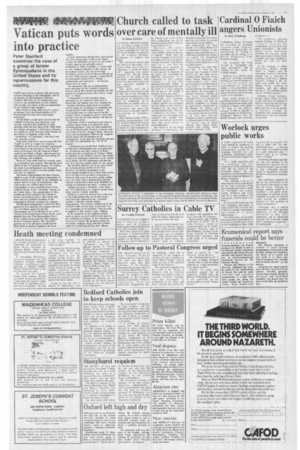Page 3, 15th March 1985
Page 3

Report an error
Noticed an error on this page?If you've noticed an error in this article please click here to report it.
Tags
Share
Related articles
Setback To Hopes Of Female Ordinations In The Church
Bishop Calls Last Orders On Luton Parish Centre
Bishops' Conference
Church Unites Against Apartheid
Bishop Silent On 'defectors
Church called to task over care of mentally ill
by Kasia Giedroye
CATHOLIC PRIESTS and laity are not doing enough to help mentally-ill people, according to a report published last week by the Social Welfare Commission of the Catholic Bishops' ,Conference of England and 'Wales.
One mentally-ill person told the authors of the report, "If I came to Mass every week in a wheelchair I would be better off", suggesting that parish' communities, though better adjusted to the needs lo the physically handicapped, have yet to rise above the stigma and fear commonly attached to mental illness.
The report calls for a reappraisal of the Church's role in the care of the mentally-ill now that more patients are being moved out of institutions and into the community. In its delineation of possible areas of intervention, the report emphasises the need for involvement of the laity and for participation in ecumenical ventures.
Dom Fabian Cowper OSB, a qualified psychotherapist, told the Catholic Herald that one of the problems of caring for the mentally-ill in the community is the lack of facilities. In his view,
the Church needs to be careful about undertaking the care of mentally-ill parishoners before it is qualified to do so.
However, the report emphasises the need for "unqualified" people in the care of patients. "What, then, do mentally-ill people, or those who love them, seek from the pastor? Actually very little. They do not look for a cure but for something more on-going in relation to the condition . . . Ile is not expected to diagnose all the types, nor understand the differing approaches: he is expected to take people
seriously . In fact with mentally-disturbed pehple he may defeat his purpose if he tries too hard. It is more important that he just be. He supplies a presence of one who cares." A Catholic chaplain involved in looking after mentallydisturbed patients told the Catholic Herald that experience and the ability to listen are more important for the clergy than specialised knowledge. This view is reflected in the report. "Any training given to the clergy must recognise and validate their priestly role and not aim to turn them into social workers or phychotherapists."
The Secretary of the Social Welfare Commission, Mr Nicholas Coote said "The report does not ask priests to become supernatural social workers . . . The professionals are there already. It is asking them to be compassionate listeners. It also suggests many practical ways in which they and their parishoners can support the mentally-ill people in their community, for example, in providing them with accommodation."
Nevertheless, the report also says that "it must not be assumed that, because of their priestly role, the clergy can be dispensed from the need to learn about human behaviour and relationships that other professionals in the field find so important." It therefore recommends that suitable priests and religious be encouraged to undergo necessary training so that every diocese might gradually build up a nucleus of resource people, and that an advisory committee be formed in each diocese, responsible to the Bishops for training and work in the mental health field. It also presses for the provision of at least three full-time Catholic psychiatric chaplaincies in different parts of the country. The Pastoral Care of People Suffering from Mental Illness, available from Catholic Social Welfare Commission, £3.00,
blog comments powered by Disqus











